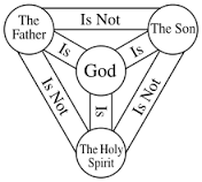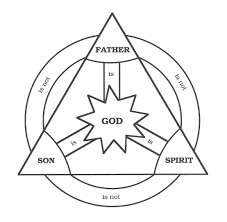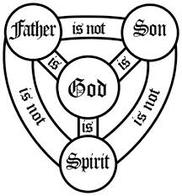|
This coming Sunday is Trinity Sunday. Each year, I find myself keeled over, guffawing at Lutheran Satire's, "St. Patrick's Bad Analogies" video. In case you haven't seen it, let me share it with you. Partialism might be my favorite heresy that St. Patrick could never have known. Now, of course Donall and Conall are right. All of the analogies that Patrick utilizes in the video break down. Part of what we as Christians need to embrace is the mystery that the One True God comes to us as Father, Son, and Holy Spirit, distinct persons within the one God. But at the risk of sounding heretical, I don't want to jettison analogies either. Why? Because all art, at least all religious art, is to some point analogical. For instance, consider Andrei Rublev's icon of the Trinity, seen below. What Rublev seems to grasp is the vitality of mystery amidst his own analogical depiction. Each character is functionally the same person, depicted in three times in three different positions. Each defers to another, implying the dance of shared leadership within the Trinity. Yet, Rublev also breaks convention by depicting the Father at all, as well as offering the Holy Spirit a bodily presence. The result is a powerful depiction of the Trinity, one that works more in metaphor than in explanation, such that the mystery of God remains. Consider that in contrast to these images. Now, each of them functionally describes the Trinity, that the persons are not one another, and yet all are somehow fully and equally the one God. The one on the left is fairly spartan, while the one in the center gets a bit more splashy. And with the Medieval script, the one on the right seems almost opulent. Yet, compared to Rublev's icon, each seems to miss something about the mystery, about the depth and breadth of God's presence.
As we approach Trinity Sunday, perhaps we need more analogies, more metaphors, more images and music, more abstract depictions of who God is and what God does in the world. Like Patrick's analogies, all will fall short of fully and faithfully describing the fullness of God. Yet, each can offer us a new perspective on God that we haven't seen before. Each may offer a new lens that may magnify or clarify God's identity in ways we couldn't have seen without the analogy. We'll never fully grasp the fullness of God, but each new look helps us to know God more. That's a beauty worth exploring, even through our bad analogies. And Patrick's, too.
25 Comments
After a number of recent articles on the decline of church attendance, and in particular this one from the Pew Research Center, authors across the internet exploded into conversation. And argumentation. And frustration.
In short, the research shows us what we already know from experience. Few people claim Christianity as their religious identity. Fewer people attend Christian worship, and those that do, attend less often. Responses seem largely summed up in defiance or desperation. Some defy the conclusions of the poll, suggesting instead that there's the same number of strong Christians, but due to the cultural shifts in expectations, fewer people feel the social pressure to attend church. The number of active Christians, this line of argumentation concludes, is relatively unchanged, so don't worry. Others despair at the loss of social respectability because faith's ostracization suggests to them the church's deathknell. The boat really is sinking, they seem to say, so let's just hunker down and enjoy ourselves while it lasts. Reality, however, is something entirely different than these conclusions. The church is not destined for failure. Neither should we ignore the significant exodus of people from our communities. To borrow a phrase from a friend, God's going to build the church with or without us. But wouldn't life be better if we were a part of that new life? That's where imagination comes in to play. A future of change is not a future of failure. Churches that look just like they did fifty years ago don't equate to success. As God works to shape the church of the future, God calls us to minister in the present. God calls us to live and work in this world, this culture, this place. That takes imagination. How can we faithfully hand on the Gospel we received in such a rapidly changing culture? We need to reimagine our futures. Not as the glory days of the past, but rather as a trail blazed into the unknown. The decline in attendance suggests that fewer people are finding reasons to come to church. Can we imagine a future where our churches are flexible enough to communicate the Gospel of Jesus Christ in ways that reconnect with those who've left? Can we imagine a future where we learn to speak the language of others, such that the Kingdom of God becomes vital in the lives of those who've never attended Christian worship? That's the story of Pentecost. God's at work doing a new thing, making the incredibly small church speak the languages of all people, all with the expressed purpose of introducing all people to Jesus. As the church imagines a future not based on past successes but rather on God's active work amongst us, then we may realized we're not destined to fail. God holds our destiny, one promised on the cross and secured with an empty tomb. If we admit our need for transformation and envision a creative future guided not by our expectations but by God's Holy Spirit, then we can see a future worth living. A future where we measure church communities not by attendees on Sunday morning but by relationships created and redemptive work in the world. A future where we're more concerned with the inclusion of all than the exclusion of a few who aren't like us. A future where the Gospel doesn't allow our preconceived notions of faithfulness to slowly bleed the church of life, but instead to embrace the vitality of God's Holy Spirit that brings new life to our dry bones. We shouldn't deny or despair for our present circumstance, but instead embrace the present as an opportunity to follow God into the future that Jesus created for us. God's building the church. Let's make sure that we're a part of that constructive vision. One of my seminary professors often spoke of how we ought to aspire for our church council meetings to become a worshipful space. Between the snickers of disbelief and skeptical questions about the viability of such a practice, I got the sense that most of my classmates found this idea improbable, if not downright impossible. Myself included.
Fortunately for us, God doesn't remain bound by our disbelief or doubt. Fortunately for me, that meant last night God showed up in a powerful way at our council meeting. While I wouldn't necessarily call it a worshipful experience, we engaged in deeply prayerful conversation around our current financial realities, our future ministry hopes, community issues that need addressed, and the identity shift we're currently undertaking as a congregation. This all began with a simple devotional practice at the outset of the meeting. We asked one another to share one placed we'd seen God at work since the last meeting, and one place we wanted to see God at work in the congregation in the coming month. What powerful stories we heard! Finding God working to bring healing and hope to youth with special needs. Seeing God moving at home through acts of surprising kindness. Even the candor of admitting that, with so many illnesses, disasters, and violences, that it's sometimes quite hard to see God at all. These prayerful conversations provided an incredible foundation from which to consider the life of our congregation. It brought a tone of authenticity and hopefulness to our time. We began to lift up examples within our congregation of good stewards rather than shrink from facing our next stewardship campaign. We discussed difficult decisions like budget changes with a sense of purpose rather than a fear of the process. Providing this kind of groundwork in council meetings, a foundation where we not only pray to God but share our stories about God and hopes for meeting God in the future, provided us with a powerful, prayerful conversation. This matters not only to those who were in attendance, but as the leadership more deeply engage God, helps to provide a faithful footing from which the entire congregation ministers. As a newly minted thirty year old (as of today), I'm already making the ridiculous jokes about the end of youth and the imminence of dentures. Though, in reality, I don't mind thirty just yet, at least in part because I was reminded my brother will turn forty within ten months.
Somewhere along the line, aging became taboo in our culture. I joke with some congregants who tell me they're turning 29 again, and that's fine. Yet, I also think aging allows us to mark time, and encourages us to remember in a more robust, faithful fashion. The movie Interstellar draws heavily upon Einstein's theory of relativity, which suggests that time passes at different speeds in different locations within the universe. The characters, when visiting different planets, had to treat time not just as a reality to face, but a resource to use. Though I'm not a theoretical physicist, this seems eminently true even in our world. Though time passes at the same speed, most of us know the feeling that some days never seem to end, and others pass with unexpected rapidity. We know that time is a resource, one we ought to use with precious care rather than flippance. As a thirty year old, this seems even more true. At the Last Supper, Jesus shares bread and wine with his disciples, sacramentally inviting them to continue this ritual, "in remembrance" of him. This word means much more than just simple memory recall. It means a rehearsal, or more accurately, a reenactment of that precious life that Jesus shares. We're called to re-member, to reconstitute the life of Jesus in our own lives, not just by ourselves, but with the entire church, the whole Body of Christ. So, as I look back on thirty years, I'm taking some time to remember God's faithfulness throughout my life, as well as the time to consider how I've used this precious resource of time. For the most part, I've loved my life. Yet, at many junctures, I know I've wasted so much time, a resource that I'll never get back. As I reflect, I realize all too often I have not remembered Jesus in the most fundamental of ways: loving God and loving my neighbor in ways that make a discernable difference in the world. I always chuckle when a friend, who has wasted time on a bad movie or a droll conversation, says, "Well there's ninety minutes of my life I'll never get back." Yet, beyond the giggle, this is also incredibly true. We've got a limited amount of time to use, and to use well. While I hope I've got at least another thirty (or forty or fifty) years left, that time will only be spent well so long as I actively remember God. Much more than a commodity, time is the best birthday gift I've received, and the most valuable one at that. Unlike most any other gift, it's literally irreplaceable. So, today, my prayer for myself and for all people is that we might use this time in a way that is constructive. Like Jesus, who used his body and blood to heal all creation, may we use our time as a remembrance of that act. May we use our limited lives in ways that shared boundless love. May we take this process of aging as a chance to reflect on how we've shared in that remembrance of Christ, and how we might better come to love, serve, and welcome all people into the love of Jesus. While we have an eternity with Christ in the resurrection, we've got but a few precious moments in this stage of life. Let's use them well. |
AuthorSimultaneously a sinner and a saint. Archives
September 2020
Categories |




 RSS Feed
RSS Feed